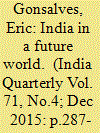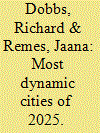| Srl | Item |
| 1 |
ID:
142002


|
|
|
|
|
| Summary/Abstract |
A forecast of the global scenario a decade hence is attempted, and the policies India should follow to gain the most advantage are suggested. The nation state system will continue, but there will be major and continuing change in the capacity and power projection of more important states and hence in their relationship. Power in all aspects will shift from the Atlantic powers to Asia and the Indian Pacific Ocean Region resulting in a multipolar system. To manage this better Asia needs to establish a regional cooperation structure. China has emerged as the single most powerful country in Asia, and the current leadership is seeking to put its own model in place. India can and should ensure a leading role for itself by becoming the most effective power in the South Asian and Indian Ocean region. For this it will have to forge a working partnership with China which will not exclude an element of competition. The boundary problem needs to be resolved. The relations with Pakistan must be managed. Relations with all other neighbours must be improved as speedily as possible. The USA will still remain the single most powerful country and close bilateral relations are crucial even while independence is not surrendered. The growing conflicts in the Middle East and the flux in supply and prices of energy need to be addressed. Enhancing domestic capacity will power India’s external projections. The demographic dividend can only be harvested by a determined pursuit of skills innovation and technology to attain excellence in economic production and social goals. This is only possible in a democracy if it moves towards greater inclusion and provides opportunity to all. Success will ensure India becomes a major global power by 2025.
|
|
|
|
|
|
|
|
|
|
|
|
|
|
|
|
| 2 |
ID:
115844


|
|
|
| 3 |
ID:
100183


|
|
|
|
|
| Publication |
2010.
|
| Summary/Abstract |
Unclassified reports the U.S. National Intelligence Council issued every four years to cover possible developments of the next decade and a half stand apart from what is published in this field all over the world. The latest of such contributions - Global Trends 2025: A Transformed World (hereinafter Report) - was published in November 2008; its draft had been completed by May 2008, before the military conflict in the Southern Caucasus which altered not so much the balance of forces in the region as the ideas of the rivaling subjects of international relations about one another. This applies, to an even greater extent, to the global crisis which spread to all spheres of economic activities in the fall of 2008 and the winter of 2009. We have to admit that the world academic community (with the exception of marginal alter-globalist and neo-Marxist trends always ready with apocalyptical forecasts of global calamities) was taken by surprise. Today, it is busy, in hindsight, looking for a rational explanation of what has happened and for possible disentanglements. In this context the authors had to move to risky forecasts of demographic and climate change, Iran's nuclear file and the state of the world financial markets. The Introduction pointed out that the individual still played an important role in history and that it is true for the totalitarian (Lenin, Stalin, Hitler, Mao Zedong) and for democratic (Churchill, Roosevelt, Truman) societies. The authors warn against the dangers of economic instability: fast economic changes (negative and positive alike) undermine the democratic institutions; they insist on the key role of technological progress in the current changes. They wrote that the numerous wars,
|
|
|
|
|
|
|
|
|
|
|
|
|
|
|
|